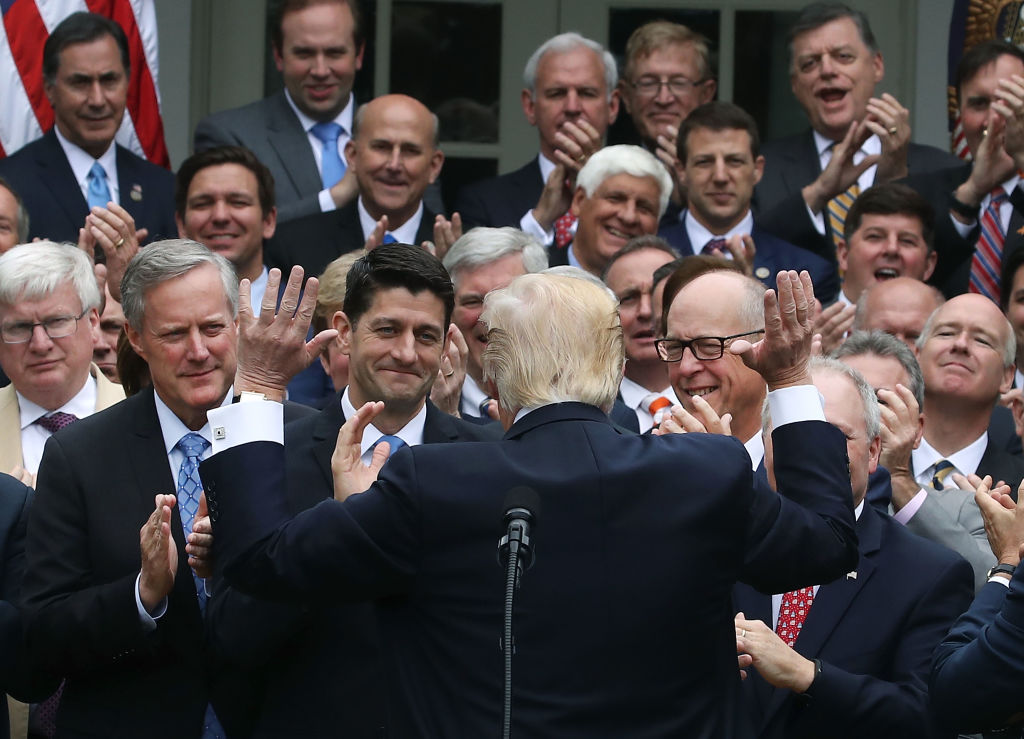GOP ex-congressman explains why House Republicans probably won't be punished for their health-care vote


A free daily email with the biggest news stories of the day – and the best features from TheWeek.com
You are now subscribed
Your newsletter sign-up was successful
On Thursday, House Republicans passed a deeply unpopular health-care bill that will affect all Americans and one-sixth of the U.S. economy, while Democrats taunted them with the Steam song "Na Na Hey Hey Kiss Him Goodbye" — as you probably already knew if you were watching cable news on Thursday:
Democrats are working off the assumption that since they lost big in the 2010 midterms after passing the Affordable Care Act — Nate Silver runs through how much ObamaCare hurt them — Republicans put their majority at risk on Thursday, with a special eye toward the yes votes from 46 House Republicans in districts that Hillary Clinton or President Obama won at least once since 2008, and more specifically the 14 in districts Clinton won in November. GOP strategist Tom Davis, a former Virginia congressman and ex-chairman of the National Republican Congressional Committee, disagrees with that political assessment.
Generally, Davis told The Atlantic that as unpopular as the American Health Care Act is nationally, including among swing voters, House Republicans faced a higher electoral risk from opposing it, since "the Democratic base is going to be spiked no matter what" and "a dispirited base going into the midterms" is more dangerous for Republicans than losing independents.
The Week
Escape your echo chamber. Get the facts behind the news, plus analysis from multiple perspectives.

Sign up for The Week's Free Newsletters
From our morning news briefing to a weekly Good News Newsletter, get the best of The Week delivered directly to your inbox.
From our morning news briefing to a weekly Good News Newsletter, get the best of The Week delivered directly to your inbox.
More specifically, the House Republicans in districts Clinton won are insulated because they tend to be "higher-income suburban districts" where President Trump is unpopular but so is ObamaCare, Davis argued. "You're not taking their stuff away, they are not the people who are getting punished" under the GOP plan, he said. And the House Republicans representing lower-income and rural Trump voters will be protected by cultural issues and Trump's nationalist bent. Unsurprisingly, Democratic strategists disagree with Davis. You can read their counterargument at The Atlantic.
A free daily email with the biggest news stories of the day – and the best features from TheWeek.com
Peter has worked as a news and culture writer and editor at The Week since the site's launch in 2008. He covers politics, world affairs, religion and cultural currents. His journalism career began as a copy editor at a financial newswire and has included editorial positions at The New York Times Magazine, Facts on File, and Oregon State University.
-
 The Gallivant: style and charm steps from Camber Sands
The Gallivant: style and charm steps from Camber SandsThe Week Recommends Nestled behind the dunes, this luxury hotel is a great place to hunker down and get cosy
-
 The President’s Cake: ‘sweet tragedy’ about a little girl on a baking mission in Iraq
The President’s Cake: ‘sweet tragedy’ about a little girl on a baking mission in IraqThe Week Recommends Charming debut from Hasan Hadi is filled with ‘vivid characters’
-
 Kia EV4: a ‘terrifically comfy’ electric car
Kia EV4: a ‘terrifically comfy’ electric carThe Week Recommends The family-friendly vehicle has ‘plush seats’ and generous space
-
 TikTok secures deal to remain in US
TikTok secures deal to remain in USSpeed Read ByteDance will form a US version of the popular video-sharing platform
-
 Unemployment rate ticks up amid fall job losses
Unemployment rate ticks up amid fall job lossesSpeed Read Data released by the Commerce Department indicates ‘one of the weakest American labor markets in years’
-
 US mints final penny after 232-year run
US mints final penny after 232-year runSpeed Read Production of the one-cent coin has ended
-
 Warner Bros. explores sale amid Paramount bids
Warner Bros. explores sale amid Paramount bidsSpeed Read The media giant, home to HBO and DC Studios, has received interest from multiple buying parties
-
 Gold tops $4K per ounce, signaling financial unease
Gold tops $4K per ounce, signaling financial uneaseSpeed Read Investors are worried about President Donald Trump’s trade war
-
 Electronic Arts to go private in record $55B deal
Electronic Arts to go private in record $55B dealspeed read The video game giant is behind ‘The Sims’ and ‘Madden NFL’
-
 New York court tosses Trump's $500M fraud fine
New York court tosses Trump's $500M fraud fineSpeed Read A divided appeals court threw out a hefty penalty against President Trump for fraudulently inflating his wealth
-
 Trump said to seek government stake in Intel
Trump said to seek government stake in IntelSpeed Read The president and Intel CEO Lip-Bu Tan reportedly discussed the proposal at a recent meeting
